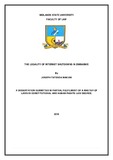Please use this identifier to cite or link to this item:
https://cris.library.msu.ac.zw//handle/11408/3923| Title: | The legality of internet shutdowns in Zimbabwe | Authors: | Makuni, Joseph Tatenda | Keywords: | legality internet shutdowns |
Issue Date: | 2019 | Publisher: | Midlands State University | Abstract: | In an ever-increasingly global age, the world has become dependent on the internet for communication purposes and transacting, the internet has become a conduit through which people exercise realise their rights. The internet provides enhanced connectivity of persons and offers a platform for free expression. The internet has further become a conduit through which individuals can realise the right to freedom of expression. Autocratic governments that feel threatened by the difficulty of regulating the internet have resorted to shutting down entire communication systems leaving their citizens stranded and frustrated. Governments have been overtaken by technological developments which have been particularly rapid in the 21st Century. As such in situations where legislation fails to regulate modern communication structures, this leads to undesirable situations where governments use outdated legislation which does not grant authority to act in such a manner. The study answers the question of whether internet shutdowns are legal in Zimbabwe and in so doing examines the impact of internet shutdowns on the right to the freedom of expression. The study explores the relationship between the internet and the right to freedom of expression examining the boundaries of free expression and the circumstances under which as a right it can be limited. The study identifies how in order for rights to be limited such limit should be proportional, provided for in the law and should seek to serve a legitimate aim. An analysis of Zimbabwe’s constitutional provisions on the right to freedom of expression and how they reverberate with international principles on the right to freedom of expression. An examination of the scope of government’s powers in respect of the Interception of Communications Act in order to determine if there is in place a legal framework that authorises the shutting down of the Internet is conducted. In line with this is a consideration of the possible justifications for shutting down communications which include the need for the preservation of the national security. The study encompasses perspectives from the jurisdiction of Pakistan in order to obtain insight into the justifiability of internet shutdowns in a modern democratic society. It is arrived at a conclusion that internet shutdowns have no place in Zimbabwean law as there is no legislation that so provides for such a phenomenon. Furthermore, the justifiability of shutting down communications for whole communities is a drastic and draconian move. Recommendations are thereby proffered to the government on how best it can maintain national security without depriving entire populations of their ability to communicate freely. | URI: | http://hdl.handle.net/11408/3923 |
| Appears in Collections: | Master of Laws: Constitutional and Human Rights Law |
Files in This Item:
| File | Description | Size | Format | |
|---|---|---|---|---|
| Joseph Makuni Chapter 1-5 Final Draft.pdf | Full Text | 543.38 kB | Adobe PDF |  View/Open |
Page view(s)
294
checked on Feb 15, 2026
Download(s)
156
checked on Feb 15, 2026
Google ScholarTM
Check
Items in MSUIR are protected by copyright, with all rights reserved, unless otherwise indicated.



